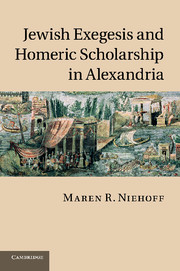Book contents
- Frontmatter
- Contents
- Acknowledgements
- List of abbreviations
- 1 Setting the stage
- Part I Early Jewish responses to Homeric scholarship
- Part II Critical Homeric scholarship in the fragments of Philo's anonymous colleagues
- Part III The inversion of Homeric scholarship by Philo
- 8 Literal methods of Homeric scholarship in Philo's Allegorical Commentary
- 9 Philo's Questions and Answers as a manual of instruction
- 10 Philo's Exposition of the Law at a significant distance from Alexandrian scholarship
- Epilogue
- References
- Index of Greek terms
- Index of sources
- Index of modern authors
- General index
9 - Philo's Questions and Answers as a manual of instruction
Published online by Cambridge University Press: 03 May 2011
- Frontmatter
- Contents
- Acknowledgements
- List of abbreviations
- 1 Setting the stage
- Part I Early Jewish responses to Homeric scholarship
- Part II Critical Homeric scholarship in the fragments of Philo's anonymous colleagues
- Part III The inversion of Homeric scholarship by Philo
- 8 Literal methods of Homeric scholarship in Philo's Allegorical Commentary
- 9 Philo's Questions and Answers as a manual of instruction
- 10 Philo's Exposition of the Law at a significant distance from Alexandrian scholarship
- Epilogue
- References
- Index of Greek terms
- Index of sources
- Index of modern authors
- General index
Summary
In this chapter we continue to investigate Philo's own work in the light of Homeric scholarship. Taking into account the variety of his exegetical series, I focus in the present chapter on the Questions and Answers on Genesis and Exodus (Q&A). This series has from the inception of modern scholarship been recognized as similar to the Allegorical Commentary, because both are running commentaries covering largely the same biblical material. Moreover, the Q&A involves a similar kind of literal and allegorical interpretation, beginning with a close reading of each verse and then leading the reader to its spiritual meaning.
Recently, the discussion of Philo's Questions and Answers has been enriched by investigating the implied audience of each series. Following a collection of articles, assembled by Hay (1991a), a rather broad consensus has emerged regarding the fact that Philo's different series address different audiences. Whereas the Commentary is acknowledged as a work appealing to specialists, the Q&A is generally taken to imply a far more general audience.
The precise role of the Q&A within Philo's overall work still remains to be examined. Important new light can be thrown on this issue by investigating the nature of the questions raised in this series. Known to Eusebius as τὰ ἐν Γενέσει καὶ τὰ ἐν Ἐξαγωγῇ ζητήματα καὶ λύσεις (Hist. eccl. 2.8.1), the Q&A self-evidently belongs to the genre of the question and answer literature. Beyond this general identification, however, no easy definitions apply.
- Type
- Chapter
- Information
- Jewish Exegesis and Homeric Scholarship in Alexandria , pp. 152 - 168Publisher: Cambridge University PressPrint publication year: 2011



